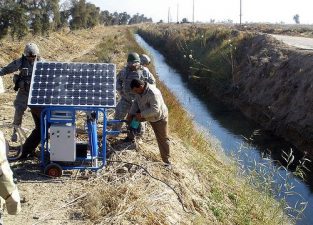The United States Environmental Protection Agency (EPA) was created in 1970 to protect human health and the environment through creation and enforcement of regulations, each backed by federal laws such as the Clean Air and Clean Water Acts. During Donald Trump’s presidential campaign, he threatened to abolish the agency, which he painted as an obstacle to big business interests. First he pledged to cut its staff of 15,000 in half. Now he’s looking at halting funding that supports the agency’s datasets. Consider it a modern day book-burning borne out of ignorance and greed.
The EPA maintains 192,322 different datasets, collecting information on everything from the chemical content of pollutants to biodiversity mapping to coastal flood analyses to emissions modeling. Anyone can access this open database for free resources that enable users to conduct research, develop web and mobile applications, design data visualizations, and calculate the emission-saving benefits of implementing energy efficiency or renewable energy policies and programs.
“There is no reason to think the data is safe,” Gretchen Goldman, research director at the Center for Science and Democracy, a program at the Union of Concerned Scientists told the Guardian. “The administration, so far, hasn’t given any indication it will respect science and scientific data, especially when it’s inconvenient to its policy agendas.”
In late January, federal staff leaked news that the EPA had frozen its grant funding program, and the EPA has reportedly been instructed to remove the climate change page from its website. (Climate change pages were scrubbed from the Whitehouse website the day Trump took office.). Trump’s threats have incited several highly publicized campaigns to save the data, continue public access, and scrutinize government websites for erroneous editing and inclusion of “alternative facts”.
The Environmental Data and Governance Initiative (EDGI) emerged as an organized response to Trump’s plan to undermine federal environmental science resources. On the group’s website, blogger Jerome Whitington wrote, “Because access to and control over data is a key piece of effective regulation, we have taken action to systematically archive valuable environmental datasets, create usable nongovernmental data access, and preserve records of wide-ranging, ephemeral, web-based policy and program information. This monitoring and tracking work has also created an opportunity for providing rapid analysis of environmental regulation during the transition.” Learn more about this project and how to host your own hackathon – called #DataRescue – on the EDGI site.
On the day of Trump’s inauguration, approximately 60 volunteers gathered in the Department of Information Studies building at the University of California Los Angeles to harvest government data. Mostly scientists and programmers, they tapped into hundreds of websites to identify, download, and safely archive as much federal climate and environment data off government sites as possible before Trump took office. Many similar “data rescue” events have since taken place at universities across North America.

As reported by Zoë Schlanger of Quartz, the hackers are uploading large data sets to datarefuge.org, a open-surce data portal, which will act as an alternative repository for pre-Trump federal information during the new administration. There will also be a copy stored outside the US, according to Michael Riedyk, CEO of the Canadian data-archiving company Page Freezer.
His company will use web crawlers to scan each page on a weekly basis. Page Freezer’s proprietary software will allow them to see if anything changes. “We have all kinds of really cool tools to highlight what changed—we can see exactly how people have edited or deleted.”
EPA data is kept in dozens of databases and represents decades of detailed monitoring. Here are eight datasets that offer a sense of the agency’s scientific knowledge. Imagine if all 192,322 datasets were discontinued.
Envirofacts – Start here to learn how to search and download data within the agency’s massive archive. (Link here.)
Air Markets Program – This dataset lets you collect information about specific air pollutants by industry. (Link here.)
Emissions and Generation Resource Database – Electricity generation is a key industry under EPA observation. This database tracks pollutant emission rates, electricity production volumes, and the fuel types used to generate power. (Link here.)
Greenhouse gas reporting – Tools offered here let you search data on greenhouse gas emissions by facility, industry and location, covering more than 8000 facilities in oil and gas, mining, power generation, chemical production, pulp and paper. (Link here.)
Beach health – See data on pollutants that affect coastal water quality, useful for state and local officials to monitor water quality and decide whether to restrict swimming or close access to public beaches. (Link here.)
National Aquatic Resource Surveys – This site gives access to many sets of data on water chemistry, habitat, land use, insects and fish species in and around streams, lakes and wetlands. (Link here.)
Hazardous waste facility monitoring – Find data on thousands of toxic factories, mines, power plants, landfills, including the history and location of a facility, information on how pollution is monitored and the enforcement actions at each location. (Link here.)
Enforcement status – Track the agency’s inspection and enforcement work relative to violations of clean air, clean water and hazardous waste laws.(Link here.)
The EPA is led by its Administrator, who is appointed by the president and approved by Congress. The current administrator Scott Pruitt denies that carbon dioxide causes global warming. Pruitt has been a voracious opponent of environmental regulations and has promised to dismantle Obama-era EPA regulations, including the Clean Power Plan. He has a history of suing the EPA to roll back air pollution regulations.





One thought on “EPA open data under threat by Trump”
Comments are closed.